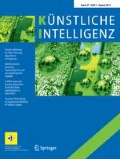Abstract
In recent years, we have seen tremendous advances in the mechatronic, sensing and computational infrastructure of robots, enabling them to act in several application domains faster, stronger and more accurately than humans do. Yet, when it comes to accomplishing manipulation tasks in everyday settings, robots often do not even reach the sophistication and performance of young children. In this article, we describe an interdisciplinary research approach in which we design computational models for controlling robots performing everyday manipulation tasks inspired by the observation of human activities.








Similar content being viewed by others
References
Bandouch J, Engstler F, Beetz M (2008) Accurate human motion capture using an ergonomics-based anthropometric human model. In: Proceedings of the fifth international conference on articulated motion and deformable objects, AMDO
Beetz M, Jain D, Mösenlechner L, Tenorth M (2010) Towards performing everyday manipulation activities. Robot Auton Syst 58(9):1085–1095
Beetz M, Stulp F, Esden-Tempski P, Fedrizzi A, Klank U, Kresse I, Maldonado A, Ruiz F (2010) Generality and legibility in mobile manipulation. Auton Robot J 28(1):21–44 (special Issue on Mobile Manipulation)
Beetz M, Tenorth M, Jain D, Bandouch J (2010) Towards automated models of activities of daily life. Technol Disabil 22:2740
Bertero M, Poggio T, Torre V (1987) Ill-posed problems in early vision. Technical Report AIM-924, Massachusetts Institute of Technology
Gibson JJ (1977) The theory of affordances. Wiley, New York
Horswill I (1996) Integrated systems and naturalistic tasks. In: Strategic directions in computing research AI working group
Li J, Maldonado A, Beetz M, Schuboe A (2009) Obstacle avoidance in a pick-and-place task. In: Proceedings of the 2009 IEEE conference on robotics and biomimetics, Guilin, Guangxi, China, December 19–23, 2009
Nebel B, Bäckström C (1994) On the computational complexity of temporal projection, planning and plan validation. Artif Intell 66(1):125–160 (ARTINT 1063)
Stulp F, Oztop E, Pastor P, Beetz M, Schaal S (2009) Compact models of motor primitive variations for predictable reaching and obstacle avoidance. In: 9th IEEE-RAS international conference on humanoid robots
Sussman GJ (1973) A computational model of skill acquisition. PhD Thesis, Massachusetts Institute of Technology
Tenorth M, Beetz M (2009) KnowRob—knowledge processing for autonomous personal robots. In: IEEE/RSJ international conference on intelligent robots and systems
Todorov E (2004) Optimality principles in sensorimotor control. Nat Neurosci 7(9):907–915
Toussaint M (2009) Probabilistic inference as a model of planned behavior. Künst Intell 3
Vernon D, Metta G, Sandini G (2007) A survey of artificial cognitive systems: Implications for the autonomous development of mental capabilities in computational agents. IEEE Trans Evol Comput 11(2):151–180
Wolpert D, Ghahramani Z (2000) Computational principles of movement neuroscience. Nat Neurosci Suppl 3:1212–1217
Wykowska A, Maldonado A, Beetz M, Schuboe A (2009) How humans optimize their interaction with the environment: the impact of action context on human perception. In: Progress in Robotics. Proceedings of the FIRA RoboWorld Congress, Incheon, Korea, August 16–20, 2009
Author information
Authors and Affiliations
Corresponding author
Rights and permissions
About this article
Cite this article
Beetz, M., Buss, M. & Radig, B. Learning from Humans—Computational Models of Cognition-Enabled Control of Everyday Activity. Künstl Intell 24, 311–318 (2010). https://doi.org/10.1007/s13218-010-0062-y
Received:
Accepted:
Published:
Issue Date:
DOI: https://doi.org/10.1007/s13218-010-0062-y




